Module 9 Life history Unit3 Language in use 同步测试卷(含解析)
文档属性
| 名称 | Module 9 Life history Unit3 Language in use 同步测试卷(含解析) | 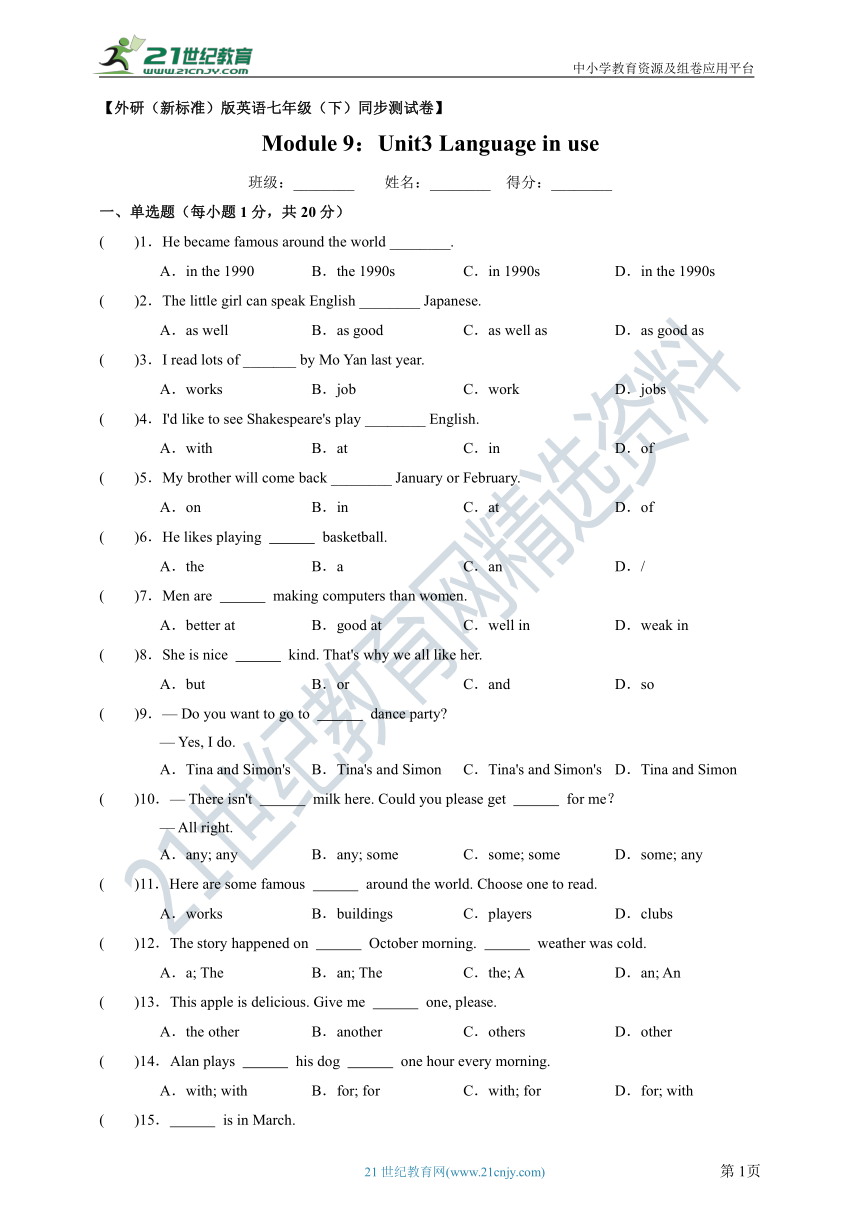 | |
| 格式 | zip | ||
| 文件大小 | 916.5KB | ||
| 资源类型 | 试卷 | ||
| 版本资源 | 外研版 | ||
| 科目 | 英语 | ||
| 更新时间 | 2020-05-05 18:56:14 | ||
图片预览

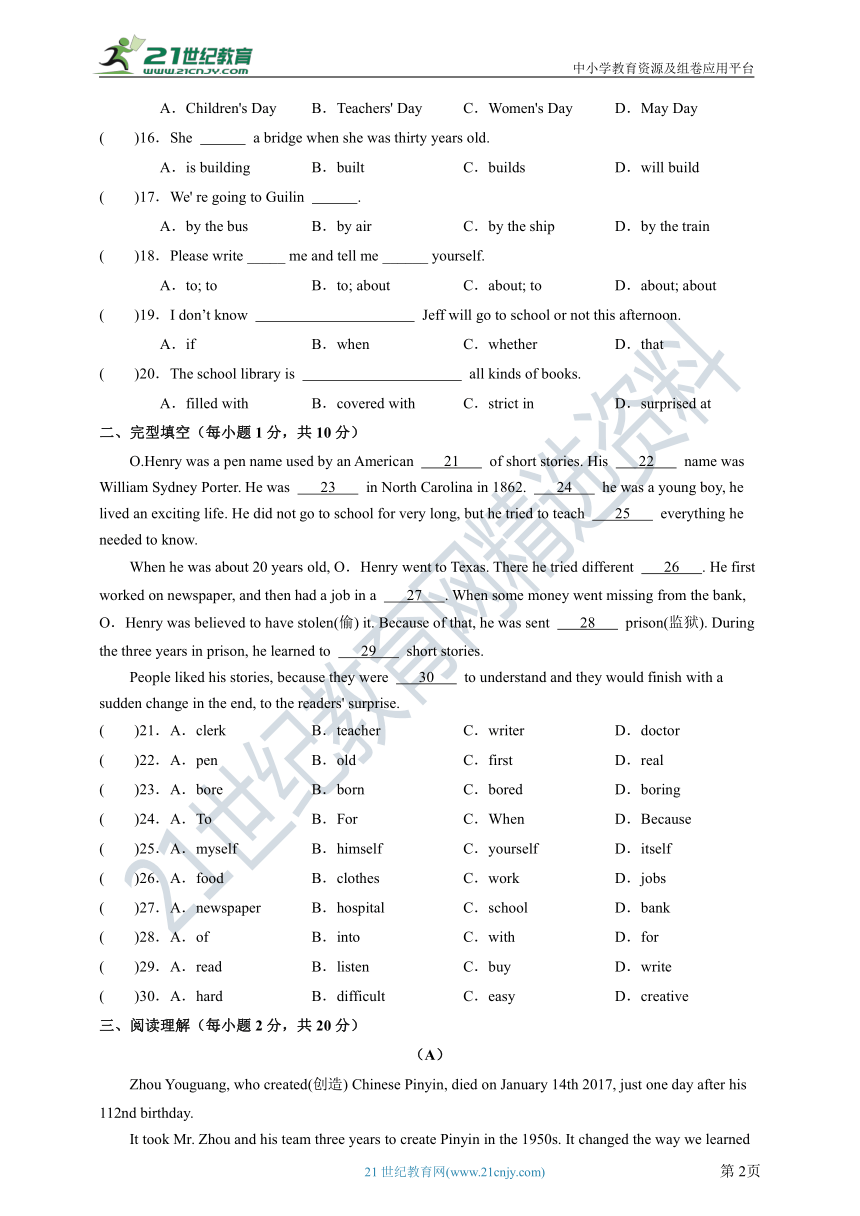
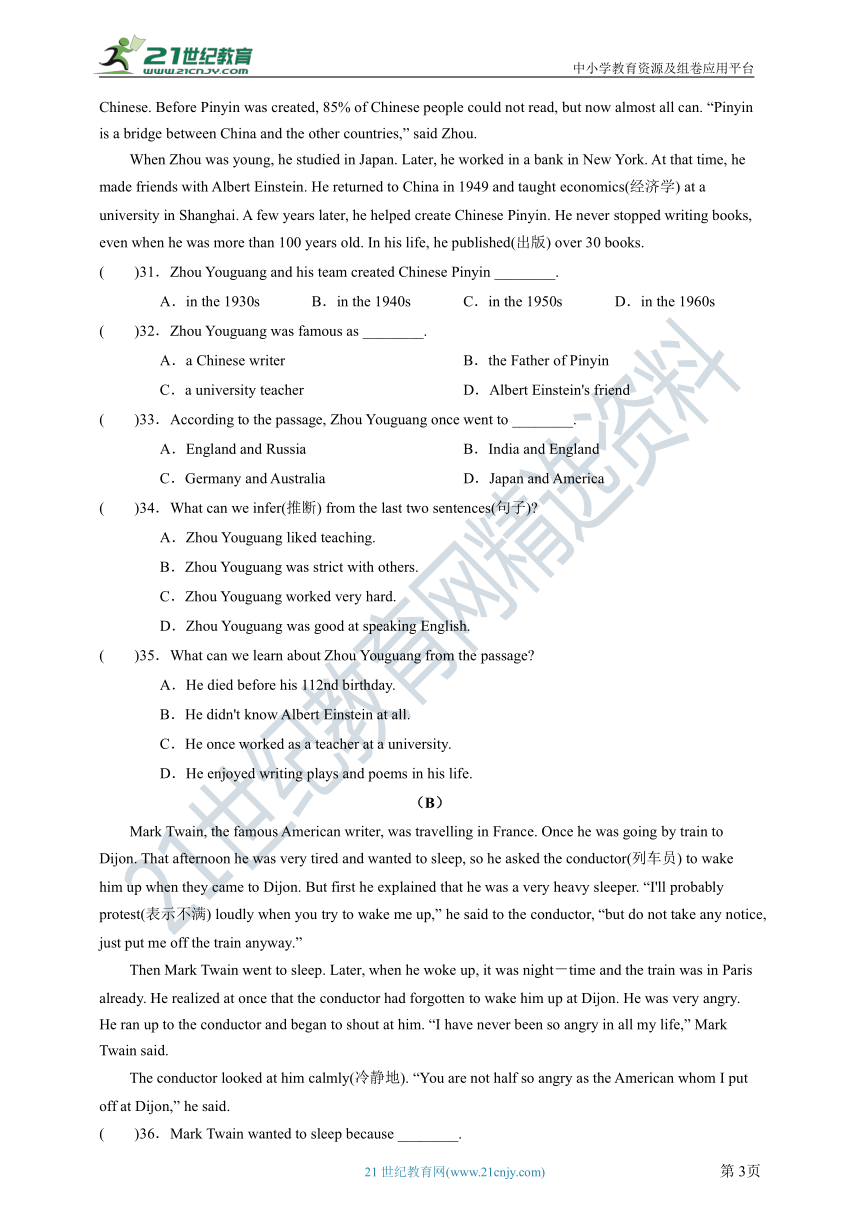
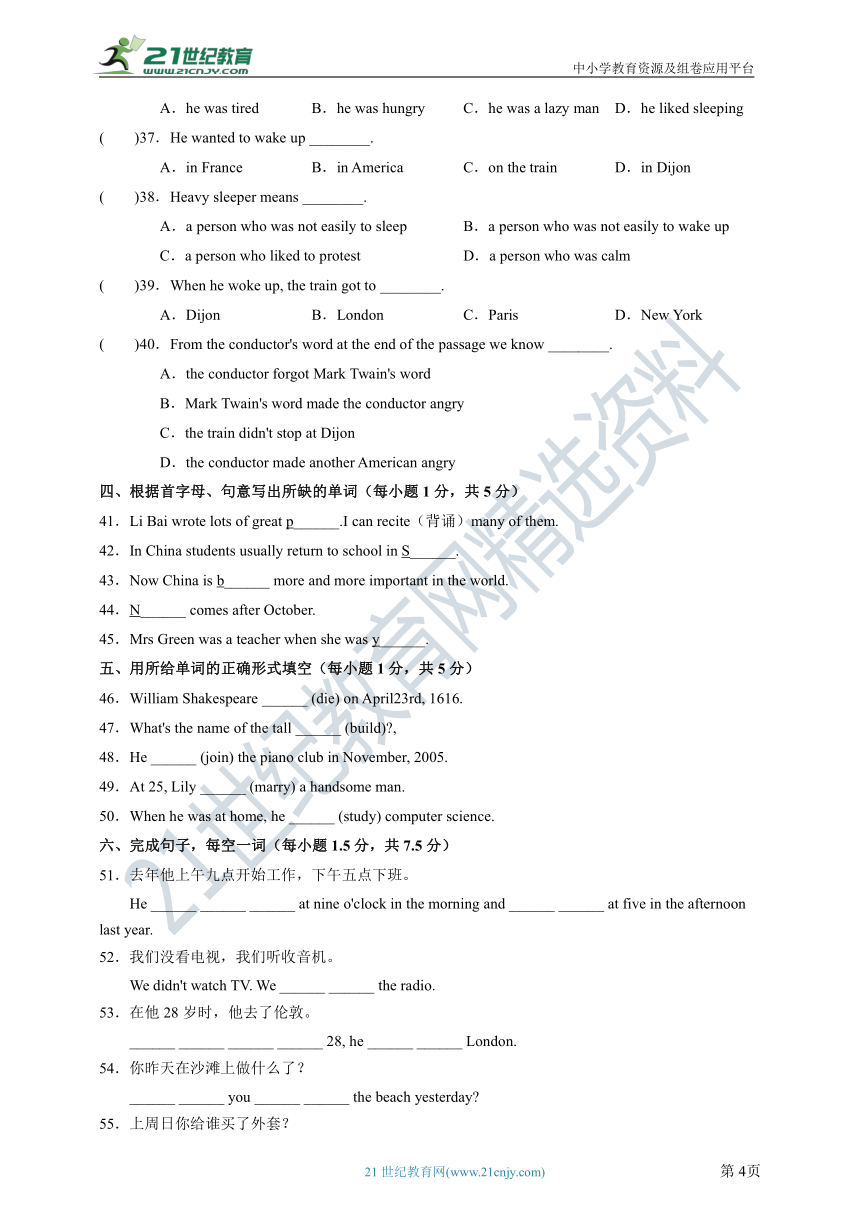
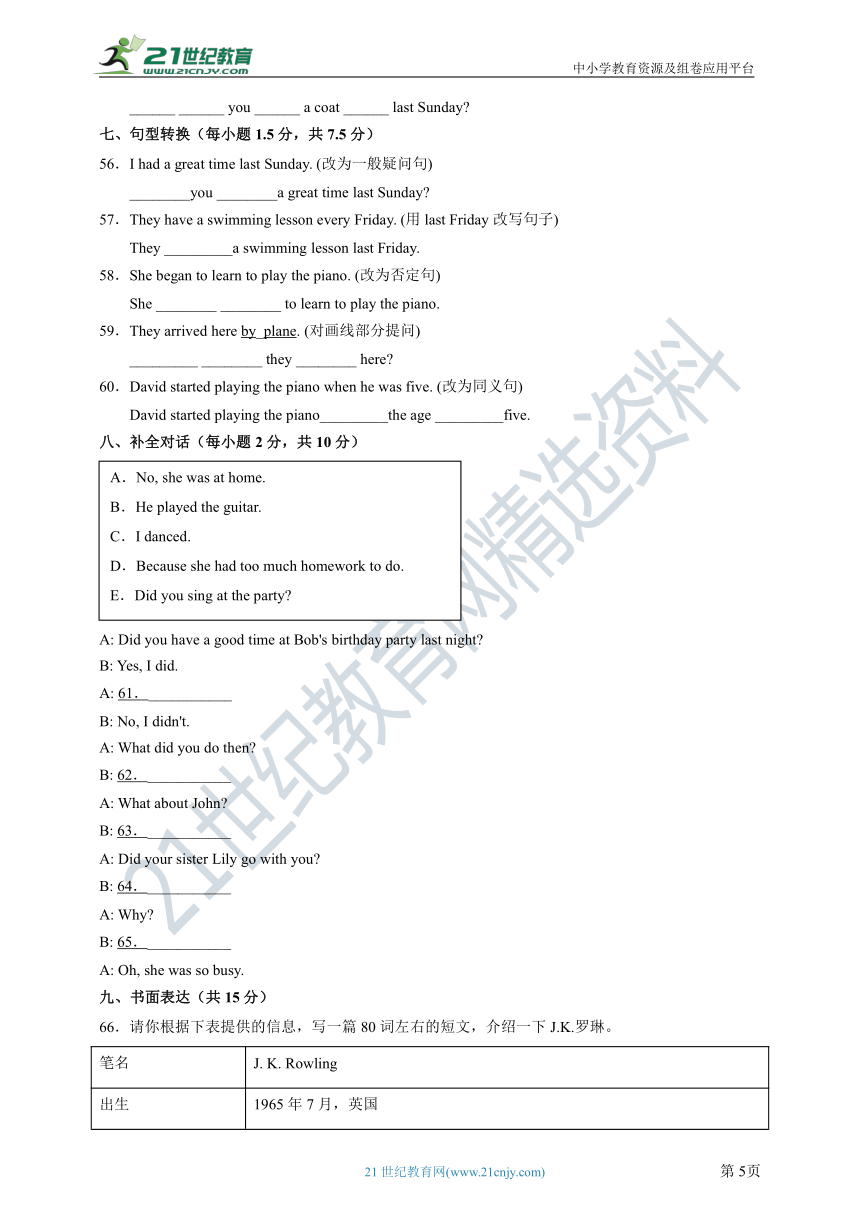
文档简介
【外研(新标准)版英语七年级(下)同步测试卷】
Module 9:Unit3 Language in use
班级:________ 姓名:________ 得分:________
一、单选题(每小题1分,共20分)
( )1.He became famous around the world ________.
A.in the 1990 B.the 1990s C.in 1990s D.in the 1990s
( )2.The little girl can speak English ________ Japanese.
A.as well B.as good C.as well as D.as good as
( )3.I read lots of _______ by Mo Yan last year.
A.works B.job C.work D.jobs
( )4.I'd like to see Shakespeare's play ________ English.
A.with B.at C.in D.of
( )5.My brother will come back ________ January or February.
A.on B.in C.at D.of
( )6.He likes playing basketball.
A.the B.a C.an D./
( )7.Men are making computers than women.
A.better at B.good at C.well in D.weak in
( )8.She is nice kind. That's why we all like her.
A.but B.or C.and D.so
( )9.— Do you want to go to dance party?
— Yes, I do.
A.Tina and Simon's B.Tina's and Simon C.Tina's and Simon's D.Tina and Simon
( )10.— There isn't milk here. Could you please get for me?
— All right.
A.any; any B.any; some C.some; some D.some; any
( )11.Here are some famous around the world. Choose one to read.
A.works B.buildings C.players D.clubs
( )12.The story happened on October morning. weather was cold.
A.a; The B.an; The C.the; A D.an; An
( )13.This apple is delicious. Give me one, please.
A.the other B.another C.others D.other
( )14.Alan plays his dog one hour every morning.
A.with; with B.for; for C.with; for D.for; with
( )15. is in March.
A.Children's Day B.Teachers' Day C.Women's Day D.May Day
( )16.She a bridge when she was thirty years old.
A.is building B.built C.builds D.will build
( )17.We' re going to Guilin .
A.by the bus B.by air C.by the ship D.by the train
( )18.Please write _____ me and tell me ______ yourself.
A.to; to B.to; about C.about; to D.about; about
( )19.I don’t know Jeff will go to school or not this afternoon.
A.if B.when C.whether D.that
( )20.The school library is all kinds of books.
A.filled with B.covered with C.strict in D.surprised at
二、完型填空(每小题1分,共10分)
O.Henry was a pen name used by an American 21 of short stories. His 22 name was William Sydney Porter. He was 23 in North Carolina in 1862. 24 he was a young boy, he lived an exciting life. He did not go to school for very long, but he tried to teach 25 everything he needed to know.
When he was about 20 years old, O.Henry went to Texas. There he tried different 26 . He first worked on newspaper, and then had a job in a 27 . When some money went missing from the bank, O.Henry was believed to have stolen(偷) it. Because of that, he was sent 28 prison(监狱). During the three years in prison, he learned to 29 short stories.
People liked his stories, because they were 30 to understand and they would finish with a sudden change in the end, to the readers' surprise.
( )21.A.clerk B.teacher C.writer D.doctor
( )22.A.pen B.old C.first D.real
( )23.A.bore B.born C.bored D.boring
( )24.A.To B.For C.When D.Because
( )25.A.myself B.himself C.yourself D.itself
( )26.A.food B.clothes C.work D.jobs
( )27.A.newspaper B.hospital C.school D.bank
( )28.A.of B.into C.with D.for
( )29.A.read B.listen C.buy D.write
( )30.A.hard B.difficult C.easy D.creative
三、阅读理解(每小题2分,共20分)
(A)
Zhou Youguang, who created(创造) Chinese Pinyin, died on January 14th 2017, just one day after his 112nd birthday.
It took Mr. Zhou and his team three years to create Pinyin in the 1950s. It changed the way we learned Chinese. Before Pinyin was created, 85% of Chinese people could not read, but now almost all can. “Pinyin is a bridge between China and the other countries,” said Zhou.
When Zhou was young, he studied in Japan. Later, he worked in a bank in New York. At that time, he made friends with Albert Einstein. He returned to China in 1949 and taught economics(经济学) at a university in Shanghai. A few years later, he helped create Chinese Pinyin. He never stopped writing books, even when he was more than 100 years old. In his life, he published(出版) over 30 books.
( )31.Zhou Youguang and his team created Chinese Pinyin ________.
A.in the 1930s B.in the 1940s C.in the 1950s D.in the 1960s
( )32.Zhou Youguang was famous as ________.
A.a Chinese writer B.the Father of Pinyin
C.a university teacher D.Albert Einstein's friend
( )33.According to the passage, Zhou Youguang once went to ________.
A.England and Russia B.India and England
C.Germany and Australia D.Japan and America
( )34.What can we infer(推断) from the last two sentences(句子)?
A.Zhou Youguang liked teaching.
B.Zhou Youguang was strict with others.
C.Zhou Youguang worked very hard.
D.Zhou Youguang was good at speaking English.
( )35.What can we learn about Zhou Youguang from the passage?
A.He died before his 112nd birthday.
B.He didn't know Albert Einstein at all.
C.He once worked as a teacher at a university.
D.He enjoyed writing plays and poems in his life.
(B)
Mark Twain, the famous American writer, was travelling in France. Once he was going by train to Dijon. That afternoon he was very tired and wanted to sleep, so he asked the conductor(列车员) to wake him up when they came to Dijon. But first he explained that he was a very heavy sleeper. “I'll probably protest(表示不满) loudly when you try to wake me up,” he said to the conductor, “but do not take any notice, just put me off the train anyway.”
Then Mark Twain went to sleep. Later, when he woke up, it was night-time and the train was in Paris already. He realized at once that the conductor had forgotten to wake him up at Dijon. He was very angry. He ran up to the conductor and began to shout at him. “I have never been so angry in all my life,” Mark Twain said.
The conductor looked at him calmly(冷静地). “You are not half so angry as the American whom I put off at Dijon,” he said.
( )36.Mark Twain wanted to sleep because ________.
A.he was tired B.he was hungry C.he was a lazy man D.he liked sleeping
( )37.He wanted to wake up ________.
A.in France B.in America C.on the train D.in Dijon
( )38.Heavy sleeper means ________.
A.a person who was not easily to sleep B.a person who was not easily to wake up
C.a person who liked to protest D.a person who was calm
( )39.When he woke up, the train got to ________.
A.Dijon B.London C.Paris D.New York
( )40.From the conductor's word at the end of the passage we know ________.
A.the conductor forgot Mark Twain's word
B.Mark Twain's word made the conductor angry
C.the train didn't stop at Dijon
D.the conductor made another American angry
四、根据首字母、句意写出所缺的单词(每小题1分,共5分)
41.Li Bai wrote lots of great p______.I can recite(背诵)many of them.
42.In China students usually return to school in S______.
43.Now China is b______ more and more important in the world.
44.N______ comes after October.
45.Mrs Green was a teacher when she was y______.
五、用所给单词的正确形式填空(每小题1分,共5分)
46.William Shakespeare ______ (die) on April23rd, 1616.
47.What's the name of the tall ______ (build)?,
48.He ______ (join) the piano club in November, 2005.
49.At 25, Lily ______ (marry) a handsome man.
50.When he was at home, he ______ (study) computer science.
六、完成句子,每空一词(每小题1.5分,共7.5分)
51.去年他上午九点开始工作,下午五点下班。
He ______ ______ ______ at nine o'clock in the morning and ______ ______ at five in the afternoon last year.
52.我们没看电视,我们听收音机。
We didn't watch TV. We ______ ______ the radio.
53.在他28岁时,他去了伦敦。
______ ______ ______ ______ 28, he ______ ______ London.
54.你昨天在沙滩上做什么了?
______ ______ you ______ ______ the beach yesterday?
55.上周日你给谁买了外套?
______ ______ you ______ a coat ______ last Sunday?
七、句型转换(每小题1.5分,共7.5分)
56.I had a great time last Sunday. (改为一般疑问句)
________you ________a great time last Sunday?
57.They have a swimming lesson every Friday. (用last Friday改写句子)
They _________a swimming lesson last Friday.
58.She began to learn to play the piano. (改为否定句)
She ________ ________ to learn to play the piano.
59.They arrived here by_plane. (对画线部分提问)
_________ ________ they ________ here?
60.David started playing the piano when he was five. (改为同义句)
David started playing the piano_________the age _________five.
八、补全对话(每小题2分,共10分)
A: Did you have a good time at Bob's birthday party last night?
B: Yes, I did.
A: 61.___________
B: No, I didn't.
A: What did you do then?
B: 62.___________
A: What about John?
B: 63.___________
A: Did your sister Lily go with you?
B: 64.___________
A: Why?
B: 65.___________
A: Oh, she was so busy.
九、书面表达(共15分)
66.请你根据下表提供的信息,写一篇80词左右的短文,介绍一下J.K.罗琳。
笔名
J. K. Rowling
出生
1965年7月,英国
作品
全世界70多种语言版本的Harry Potter
家庭情况
两个女儿,一个儿子
经历
5岁上学
爱好
小时候喜欢讲故事
_______________________________________________________________________________________
_______________________________________________________________________________________
_______________________________________________________________________________________
_______________________________________________________________________________________
_______________________________________________________________________________________
_______________________________________________________________________________________
_______________________________________________________________________________________
参考答案
1.D
【解析】句意:在上世纪90年代他在全世界出名了。
考查介词短语。表示“在……世纪……年代”,应用介词in,短语中必须有定冠词the,年代后加s。因此“二十世纪九十年代”应该是in the 1990s,故选D。
2.C
【解析】句意:这个小女孩会说英语和日语。
考查短语辨析。as well也;as good后缺少另一个as;as well as和,还有;像……一样好;as good as和……一样好。根据句意可知,该空连接English 和Japanese,应用as well as。故选C。
3.A
【解析】句意:去年我读了很多莫言的作品。
考查名词辨析。works作品,可数名词复数形式;job工作,可数名词;work工作,不可数名词;jobs是复数形式。莫言是著名的作家,因此这里表示“阅读了他的作品”,故选A。
4.C
【解析】句意:我想看莎士比亚的英文戏剧。
考查介词辨析。with用,后面常跟工具;at在具体的时间点或地点;in在……里面;用……材料;用某种语言;of……的。空后English是语言,应用介词in。故选C。
5.B
【解析】句意:我的哥哥将在一月或二月回来。
考查介词辨析。on在具体 某一天;in在年代、月份前;泛指在上午、下午或晚上;at在具体的时间点;of……的。空后January or February是月份名称,应用介词in。故选B。
6.D
【解析】句意:他喜欢打篮球。
The表示特指;a/an表示泛指,a用在辅音音素开头的单词前,an用在元音音素开头的单词前。根据play+球类,表示打……球;play basketball.表示打篮球。根据题意,故选D。
7.A
【解析】句意:男人比女人更擅长制作电脑。
Be good at…表示擅长……;be better at…表示更擅长……;do well in…在……方面做得好;be weak in…在……方面弱。根据than women.可知这里用形容词的比较级,be better at…表示更擅长……。根据题意,故选A。
8.C
【解析】句意:她是漂亮和善良的,那是为什么我们都喜欢她。
A. but但是,B. or 或者;C. and和,又;D. so因此。根据下文That's why we all like her.可知这里是并列关系用and连接。And在这里连接两个并列的形容词。根据题意,故选C。
9.A
【解析】句意:——你想去蒂娜和西蒙的舞会吗?——是的,我想。
这里是名词所有各种,分别所有用A’s and B’s ;A and B’s表示AB两人公共所有。根据dance party是单数,这里是两人共同的舞会。根据题意,故选A。
10.B
【解析】句意:——这儿没有牛奶了,请你为我弄一些好吗?
any用于否定句;some用于肯定句或请求对方并希望得到肯定回答的一般疑问句中。第一句是否定句,该空用any,第二句是希望得到对方的肯定回答,这里用some。根据题意,故选B。
11.A
【解析】句意:这里有一些世界著名的作品。选择一个阅读。
A. works作品;B. buildings建筑物;C. players运动员;D. clubs俱乐部。根据下文Choose one to read.可知这里是说作品。根据题意,故选A。
12.B
【解析】句意:这个故事发生在10月1日。天气是冷的。
第一空表示泛指,October是以元音音素开头,用不定冠词an;第二空表示特指用定冠词the。根据题意,故选B。
13.B
【解析】句意:这个苹果是美味的。请再给我一个。
A. the other其他的,后加名词复数,表示特指。;B. another另一个,不定数目的另一个,后加名词单数; C. others别的,其他的,代词;D. other别的,其他的,后加名词复数,表示泛指;根据This apple is delicious.可知下文是再一个,又一个another one表示再一个,根据题意,故选B。
14.C
【解析】句意:艾伦每天早上和他的狗玩一个小时。
Play with sb.表示和某人一起玩;for+一段时间,根据题意,故选C。
15.C
【解析】句意:妇女节是在三月。
A. Children's Day儿童节;B. Teachers' Day教师节;C. Women's Day妇女节;D. May Day五一。March是三月,可知这里是妇女节。根据常识,故选C。
16.B
【解析】句意:她三十岁时建了一座桥。
A. is building 正在建,现在进行时;B. built建造,一般过去式;C. builds建造,第三人称单数;D. will build将建造,一般将来时。根据when she was thirty years old.可知上文用一般过去时态。根据题意,故选B。
17.B
【解析】句意:我们打算乘飞机去桂林。
By+交通工作,中间不加任何冠词,by air表示乘飞机。根据题意,故选B。
18.B
【解析】句意:请给我写信告诉我你的情况。write to sb写信给某人,about关于,故选B
19.C
【解析】句意:我不知道杰夫今天下午是否去上学。A. if是否,如果;B. when当…时候;C. whether是否;D. that引导陈述句宾语从句或定语从句。If是否讲不可与or连用,whether…or…:是…还是不是,是否,无论…还…;结合句意可知选C。
20.A
【解析】句意:学校的图书馆里摆满了各种各样的书。A. be filled with:充满着…,充满着…;B. be covered with:某物被…覆盖,某物覆盖着….;C. be strict in:对…严格要求;D.be surprised at:对…感到惊奇,对…感到好奇。结合句意可知选A。
21.C 22.D 23.B 24.C 25.B
26.D 27.D 28.B 29.D 30.C
【解析】欧亨利是美国著名的短篇小说家,他的故事中结尾往往有一个突然的变化,让读者感到惊讶。这篇短文给我们介绍了欧亨利的生平。
21.句意:欧亨利是一位美国短篇小说作家的笔名。
考查名词辨析及语境。clerk职员,办事员;teacher老师;writer作家;doctor医生。根据下文 “People liked his stories”可知,欧亨利是写短篇小说的,所以他是一个作家。故选C。
22.句意:他真实的名字叫William Sydney Porter.。
考查形容词辨析及语境。pen钢笔;old老的;旧的;first第一,首先;real真实的,实际的。上句话 “O. Henry was a pen name”提到欧亨利是一个笔名,这里说的是他的真实姓名。故选D。
23.句意:他1862年出生在北卡罗莱纳州。
考查形容词辨析及语境。bore使厌烦;born出生;bored感到厌烦的;boring令人厌烦的。根据句意可知,这句话介绍的是欧亨利的出生时间和地点。故选B。
24.句意:当他还是个小男孩的时候,他过着激动人心的生活。
考查连词辨析及语境。To到……,介词;For为了,因为;When当……时候;Because因为。根据句意可知,这句话介绍的是欧亨利小时候的生活,应用When引导时间状语从句,故选C。
25.句意:他很长时间没有去上学,但他试图自学他需要知道的一切。
考查反身代词辨析及语境。myself我自己;himself他自己;yourself你自己;itself它自己。这句话的主语是he,指代欧亨利,反身代词应用himself。故选B。
26.句意:在那里他尝试了不同的工作。
考查名词辨析及语境。food食物;clothes衣服;work工作,指工作的性质,不可数名词;jobs工作,具体的工作。根据下句话 “He first worked on newspaper, and then had a job in a ___7___.”可知,欧亨利尝试了不同的工作,这些是具体的工作,空前different修饰名词复数,应用jobs。故选D。
27.句意:他先是在报社工作,然后在一家银行得到了一份工作。
考查名词辨析及语境。newspaper报纸,报社;hospital医院;school学校;bank银行。根据下文 “When some money went missing from the bank, O.Henry was believed to have stolen(偷) it.”可知,欧亨利被认为偷了银行的钱,由此可知他在银行工作。故选D。
28.句意:因为那件事,他被送进了监狱。
考查介词辨析及语境。of……的;into到……里面;with和……一起;for为了,因为。根据上句话 “When some money went missing from the bank, O.Henry was believed to have stolen(偷) it.”以及下文 “During the three years in prison”可知,欧亨利被送进了监狱,这句话使用了短语send sb. into prison,故选B。
29.句意:在监狱的三年里,他学会了写短篇故事。
考查动词辨析及语境。read阅读;listen听;buy买;write写。根据文意和第一小题的解释可知,欧亨利是写短篇小说的一个作家,所以这里指“写短篇小说”。故选D。
30.句意:人们喜欢他的故事,因为它们很容易理解,会以一个突然的变化结束,让读者感到惊讶。
考查形容词辨析及语境。hard困难的;difficult困难的;easy容易的;creative有创造力的。根据句意 “People liked his stories…”可知,人们喜欢他的故事,故A和B选项不对;空后是…to understand,D选项意思不合适。故选C。
31.C 32.B 33.D 34.C 35.C
【解析】你知道“汉语拼音之父”是谁吗?是周有光,他和他的团队在上世纪50年代的时候,花费了三年的时间创造了拼音,改变了我们学习语文的方式。这篇短文给我们介绍了周有光的生平。
31.细节理解题。根据短文第二段 “It took Mr. Zhou and his team three years to create Pinyin in the 1950s.”可知,周有光和他的团队是在上世纪50年代创造出了汉语拼音。故选C。
32.细节理解题。根据短文开头 “Zhou Youguang, who created(创造) Chinese Pinyin”可知,周有光创造了汉语拼音,被称为“汉语拼音之父”,这是他最伟大的成就。故选B。
33.细节理解题。根据短文第三段 “When Zhou was young, he studied in Japan. Later, he worked in a bank in New York.”可知,周有光年轻时在日本读书,后来在纽约的一个银行工作。由此可知他去过日本和美国。故选D。
34.推理判断题。由文章最后两句话 “He never stopped writing books, even when he was more than 100 years old. In his life, he published(出版) over 30 books.” “他从没停止写书,甚至当他已经100多岁的时候。在他的一生中,他出版了30多本书”。从这里可以看出周有光工作非常努力。故选C。
35.细节理解题。根据短文第三段 “He returned to China in 1949 and taught economics(经济学) at a university in Shanghai.”可知,周有光回国后,在上海的一所大学里教书,C选项符合文意,故选C。根据短文第一段 “Zhou Youguang, who created(创造) Chinese Pinyin, died on January 14th 2017, just one day after his 112nd birthday.”可知A不对;根据第三段 “At that time, he made friends with Albert Einstein.”可知B不对;文章中并没有说周有光喜欢写戏剧和诗歌,故D选项不对。
36.A 37.D 38.B 39.C 40.D
【解析】这篇短文给我们讲述了美国著名作家马克吐温的故事。他在法国旅行,在火车上他让列车员在他到达目的地的时候喊醒他,但是当他醒来的时候,他已经坐过站了。原来是列车员喊错了人。
36.细节理解题。根据短文第一段中 “That afternoon he was very tired and wanted to sleep”可知,马克吐温那天下午很累,想睡觉。故选A。
37.细节理解题。根据短文第一段中 “so he asked the conductor(列车员) to wake him up when they came to Dijon.”可知,马克吐温要去Dijon这个地方,所以他让列车员在那个地方把他喊醒。故选D。
38.推理判断题。根据文章的语境可知,马克吐温想要睡觉,他让列车员等到达他那一站的时候把他喊醒,怕睡过了,说明他睡觉很沉,不容易喊醒。故选B。
39.细节理解题。根据短文第二段中 “Later, when he woke up, it was night-time and the train was in Paris already.”可知,当马克吐温醒来的时候,火车已经到达了巴黎。故选C。
40.推理判断题。根据短文最后一段 “The conductor looked at him calmly(冷静地). “You are not half so angry as the American whom I put off at Dijon,” he said.”,“你还没有我在Dijon打发走的那个美国人一半生气”,由此可知,列车员让另一个美国人很生气。故选D。
41.poems
42.September
43.becoming
44.November
45.young
【解析】
41.句意:李白写了许多伟大的诗,我能背诵它们中的一些。
lots of+名词复数。poem的意思是“诗”,根据句意及首字母,故填poems。
42.句意:在中国学生们通常在九月份返回学校。
September九月。根据句意及首字母,故填September。
43.句意:现在中国在世界上变得越来越重要。
这里是现在进行时,其结构是be doing的形式,become的现在分词是becoming。根据句意及首字母,故填becoming。
44.句意:11月在10月的后面。
November的意思是“11月”,根据句意及首字母,故填November。
45.句意:当Mrs Green还年轻的时候就是一名老师。
young的意思是“年轻的”,形容词作表语,根据句意及首字母,
故填young。
46.died
47.building
48.joined
49.married
50.studied
【解析】
46.句意:William Shakespeare死于1616年的4月23日。
这里是一般过去时态,die的过去式是died,根据句意,故填died。
47.句意:这座高楼叫什么名字?
the+名词,build的名词是building,意思是“建筑物”,根据句意,故填building。
48.句意:在2005年11月份,他加入了钢琴俱乐部。
根据时间状语in November, 2005.可知用一般过去时态,join的过去式是joined。根据句意,故填joined。
49.句意:在25岁的时候,Lily嫁给了一个帅气的男孩。根据At 25可知这里用一般过去时态,marry的意思是“嫁给”,根据句意,故填married。
50.句意:当他在家的时候,他学习计算机科学。
根据When he was at home可知用一般过去时态,study的过去式是studied。根据句意,故填studied。
51.started to work left work
52.listened to
53.At the age of left for
54.What did do on
55.Whom did buy for
【解析】
51.短语start to do sth.表示开始做某事;leave work下班;这里是一般过去时态,start的过去式是started;leave的过去式是left。根据汉语提示,故填started to work ;left work。
52.短语listen to…表示听……;这里是一般过去时态,listen的过去式是listened。根据汉语提示,故填listened to。
53.短语At the age of…表示在……岁的时候;短语leave for..出发……,去了……;在句首字母要大写;这里是一般过去时态,leave的过去式是left。根据汉语提示,故填At the age of ;left for。
54.What提问什么;这里是一般过去时态的特殊疑问句,要借助助动词did构成,What did +主语+动词原形?on the beach表示在沙滩上。根据汉语提示,故填What did do on。
55.根据时间状语last Sunday可知,这里是是一般过去时态的特殊疑问句,提问谁,用whom。其结构是Whom did+主语+动词原形+其他?短语buy sth. for sb.表示为某人买某物。根据汉语提示,故填Whom did ; buy ; for。
56.Did have
57.had
58.didn’t begin
59.How did arrive
60.at of
【解析】
56.句意:上个星期天我玩得非常开心。
本题要求改为一般疑问句,原句中had是实意动词的过去式形式,一般疑问句应用助动词did构成,注意第二个空应把过去式变为原形。故答案为Did, have。
57.句意:他们每周五上游泳课。
本题要求用last Friday改写句子,意为“上周五”,表示过去的时间,所以这句话的时态应变为一般过去时,谓语动词变为过去式。故答案为had。
58.句意:她开始学习弹钢琴。
本题要求改为否定句,谓语动词began是过去式,否定句应用助动词did构成,在did后加not,缩写为didn’t。注意原来的过去式应变为原形begin。故答案为didn’t begin。
59.句意:他们乘坐飞机到达了这里。
句中划线部分by plane表示他们到达这里的方式,疑问词应用How,意为“怎样”;原句使用了一般过去时,arrived是实意动词,疑问句应用助动词did构成,原来动词的过去式应变为原形。故答案为How, did, arrive。
60.句意:当David五岁的时候,他开始弹钢琴。
原句是when引导时间状语从句,表示“当……时候”;同义句中使用了短语at the age of…表示“在……岁的时候”。故答案为at, of。
61.E 62.C 63.B 64.A 65.D
【解析】这个对话是A询问B昨天晚上参加Bob的生日聚会玩的怎么样。
61.根据下文No, I didn't.可知上文是Did you sing at the party?你在聚会上唱歌了吗?故选E。
62.根据上文What did you do then?可知下文是I danced.我跳舞了。故选C。
63.根据上文What about John?可知下文是He played the guitar.他弹吉他了。故选B。
64.根据上文Did your sister Lily go with you?可知下文是No, she was at home.不,她在家。
故选A。
65.根据上文Why?可知下文是Because she had too much homework to do.因为她有许多作业要做。
故选D。
66.J. K. Rowling is my favourite writer. But it's not her real name. She was born in England in July, 1965. She has three children, two daughters and a son. At the age of 5, she went to school. When she was young, she liked telling stories. Harry Potter is one of her most famous works. Today you can read it in over 70 languages. I think J.K. Rowling is one of the most successful writers in the world.
Module 9:Unit3 Language in use
班级:________ 姓名:________ 得分:________
一、单选题(每小题1分,共20分)
( )1.He became famous around the world ________.
A.in the 1990 B.the 1990s C.in 1990s D.in the 1990s
( )2.The little girl can speak English ________ Japanese.
A.as well B.as good C.as well as D.as good as
( )3.I read lots of _______ by Mo Yan last year.
A.works B.job C.work D.jobs
( )4.I'd like to see Shakespeare's play ________ English.
A.with B.at C.in D.of
( )5.My brother will come back ________ January or February.
A.on B.in C.at D.of
( )6.He likes playing basketball.
A.the B.a C.an D./
( )7.Men are making computers than women.
A.better at B.good at C.well in D.weak in
( )8.She is nice kind. That's why we all like her.
A.but B.or C.and D.so
( )9.— Do you want to go to dance party?
— Yes, I do.
A.Tina and Simon's B.Tina's and Simon C.Tina's and Simon's D.Tina and Simon
( )10.— There isn't milk here. Could you please get for me?
— All right.
A.any; any B.any; some C.some; some D.some; any
( )11.Here are some famous around the world. Choose one to read.
A.works B.buildings C.players D.clubs
( )12.The story happened on October morning. weather was cold.
A.a; The B.an; The C.the; A D.an; An
( )13.This apple is delicious. Give me one, please.
A.the other B.another C.others D.other
( )14.Alan plays his dog one hour every morning.
A.with; with B.for; for C.with; for D.for; with
( )15. is in March.
A.Children's Day B.Teachers' Day C.Women's Day D.May Day
( )16.She a bridge when she was thirty years old.
A.is building B.built C.builds D.will build
( )17.We' re going to Guilin .
A.by the bus B.by air C.by the ship D.by the train
( )18.Please write _____ me and tell me ______ yourself.
A.to; to B.to; about C.about; to D.about; about
( )19.I don’t know Jeff will go to school or not this afternoon.
A.if B.when C.whether D.that
( )20.The school library is all kinds of books.
A.filled with B.covered with C.strict in D.surprised at
二、完型填空(每小题1分,共10分)
O.Henry was a pen name used by an American 21 of short stories. His 22 name was William Sydney Porter. He was 23 in North Carolina in 1862. 24 he was a young boy, he lived an exciting life. He did not go to school for very long, but he tried to teach 25 everything he needed to know.
When he was about 20 years old, O.Henry went to Texas. There he tried different 26 . He first worked on newspaper, and then had a job in a 27 . When some money went missing from the bank, O.Henry was believed to have stolen(偷) it. Because of that, he was sent 28 prison(监狱). During the three years in prison, he learned to 29 short stories.
People liked his stories, because they were 30 to understand and they would finish with a sudden change in the end, to the readers' surprise.
( )21.A.clerk B.teacher C.writer D.doctor
( )22.A.pen B.old C.first D.real
( )23.A.bore B.born C.bored D.boring
( )24.A.To B.For C.When D.Because
( )25.A.myself B.himself C.yourself D.itself
( )26.A.food B.clothes C.work D.jobs
( )27.A.newspaper B.hospital C.school D.bank
( )28.A.of B.into C.with D.for
( )29.A.read B.listen C.buy D.write
( )30.A.hard B.difficult C.easy D.creative
三、阅读理解(每小题2分,共20分)
(A)
Zhou Youguang, who created(创造) Chinese Pinyin, died on January 14th 2017, just one day after his 112nd birthday.
It took Mr. Zhou and his team three years to create Pinyin in the 1950s. It changed the way we learned Chinese. Before Pinyin was created, 85% of Chinese people could not read, but now almost all can. “Pinyin is a bridge between China and the other countries,” said Zhou.
When Zhou was young, he studied in Japan. Later, he worked in a bank in New York. At that time, he made friends with Albert Einstein. He returned to China in 1949 and taught economics(经济学) at a university in Shanghai. A few years later, he helped create Chinese Pinyin. He never stopped writing books, even when he was more than 100 years old. In his life, he published(出版) over 30 books.
( )31.Zhou Youguang and his team created Chinese Pinyin ________.
A.in the 1930s B.in the 1940s C.in the 1950s D.in the 1960s
( )32.Zhou Youguang was famous as ________.
A.a Chinese writer B.the Father of Pinyin
C.a university teacher D.Albert Einstein's friend
( )33.According to the passage, Zhou Youguang once went to ________.
A.England and Russia B.India and England
C.Germany and Australia D.Japan and America
( )34.What can we infer(推断) from the last two sentences(句子)?
A.Zhou Youguang liked teaching.
B.Zhou Youguang was strict with others.
C.Zhou Youguang worked very hard.
D.Zhou Youguang was good at speaking English.
( )35.What can we learn about Zhou Youguang from the passage?
A.He died before his 112nd birthday.
B.He didn't know Albert Einstein at all.
C.He once worked as a teacher at a university.
D.He enjoyed writing plays and poems in his life.
(B)
Mark Twain, the famous American writer, was travelling in France. Once he was going by train to Dijon. That afternoon he was very tired and wanted to sleep, so he asked the conductor(列车员) to wake him up when they came to Dijon. But first he explained that he was a very heavy sleeper. “I'll probably protest(表示不满) loudly when you try to wake me up,” he said to the conductor, “but do not take any notice, just put me off the train anyway.”
Then Mark Twain went to sleep. Later, when he woke up, it was night-time and the train was in Paris already. He realized at once that the conductor had forgotten to wake him up at Dijon. He was very angry. He ran up to the conductor and began to shout at him. “I have never been so angry in all my life,” Mark Twain said.
The conductor looked at him calmly(冷静地). “You are not half so angry as the American whom I put off at Dijon,” he said.
( )36.Mark Twain wanted to sleep because ________.
A.he was tired B.he was hungry C.he was a lazy man D.he liked sleeping
( )37.He wanted to wake up ________.
A.in France B.in America C.on the train D.in Dijon
( )38.Heavy sleeper means ________.
A.a person who was not easily to sleep B.a person who was not easily to wake up
C.a person who liked to protest D.a person who was calm
( )39.When he woke up, the train got to ________.
A.Dijon B.London C.Paris D.New York
( )40.From the conductor's word at the end of the passage we know ________.
A.the conductor forgot Mark Twain's word
B.Mark Twain's word made the conductor angry
C.the train didn't stop at Dijon
D.the conductor made another American angry
四、根据首字母、句意写出所缺的单词(每小题1分,共5分)
41.Li Bai wrote lots of great p______.I can recite(背诵)many of them.
42.In China students usually return to school in S______.
43.Now China is b______ more and more important in the world.
44.N______ comes after October.
45.Mrs Green was a teacher when she was y______.
五、用所给单词的正确形式填空(每小题1分,共5分)
46.William Shakespeare ______ (die) on April23rd, 1616.
47.What's the name of the tall ______ (build)?,
48.He ______ (join) the piano club in November, 2005.
49.At 25, Lily ______ (marry) a handsome man.
50.When he was at home, he ______ (study) computer science.
六、完成句子,每空一词(每小题1.5分,共7.5分)
51.去年他上午九点开始工作,下午五点下班。
He ______ ______ ______ at nine o'clock in the morning and ______ ______ at five in the afternoon last year.
52.我们没看电视,我们听收音机。
We didn't watch TV. We ______ ______ the radio.
53.在他28岁时,他去了伦敦。
______ ______ ______ ______ 28, he ______ ______ London.
54.你昨天在沙滩上做什么了?
______ ______ you ______ ______ the beach yesterday?
55.上周日你给谁买了外套?
______ ______ you ______ a coat ______ last Sunday?
七、句型转换(每小题1.5分,共7.5分)
56.I had a great time last Sunday. (改为一般疑问句)
________you ________a great time last Sunday?
57.They have a swimming lesson every Friday. (用last Friday改写句子)
They _________a swimming lesson last Friday.
58.She began to learn to play the piano. (改为否定句)
She ________ ________ to learn to play the piano.
59.They arrived here by_plane. (对画线部分提问)
_________ ________ they ________ here?
60.David started playing the piano when he was five. (改为同义句)
David started playing the piano_________the age _________five.
八、补全对话(每小题2分,共10分)
A: Did you have a good time at Bob's birthday party last night?
B: Yes, I did.
A: 61.___________
B: No, I didn't.
A: What did you do then?
B: 62.___________
A: What about John?
B: 63.___________
A: Did your sister Lily go with you?
B: 64.___________
A: Why?
B: 65.___________
A: Oh, she was so busy.
九、书面表达(共15分)
66.请你根据下表提供的信息,写一篇80词左右的短文,介绍一下J.K.罗琳。
笔名
J. K. Rowling
出生
1965年7月,英国
作品
全世界70多种语言版本的Harry Potter
家庭情况
两个女儿,一个儿子
经历
5岁上学
爱好
小时候喜欢讲故事
_______________________________________________________________________________________
_______________________________________________________________________________________
_______________________________________________________________________________________
_______________________________________________________________________________________
_______________________________________________________________________________________
_______________________________________________________________________________________
_______________________________________________________________________________________
参考答案
1.D
【解析】句意:在上世纪90年代他在全世界出名了。
考查介词短语。表示“在……世纪……年代”,应用介词in,短语中必须有定冠词the,年代后加s。因此“二十世纪九十年代”应该是in the 1990s,故选D。
2.C
【解析】句意:这个小女孩会说英语和日语。
考查短语辨析。as well也;as good后缺少另一个as;as well as和,还有;像……一样好;as good as和……一样好。根据句意可知,该空连接English 和Japanese,应用as well as。故选C。
3.A
【解析】句意:去年我读了很多莫言的作品。
考查名词辨析。works作品,可数名词复数形式;job工作,可数名词;work工作,不可数名词;jobs是复数形式。莫言是著名的作家,因此这里表示“阅读了他的作品”,故选A。
4.C
【解析】句意:我想看莎士比亚的英文戏剧。
考查介词辨析。with用,后面常跟工具;at在具体的时间点或地点;in在……里面;用……材料;用某种语言;of……的。空后English是语言,应用介词in。故选C。
5.B
【解析】句意:我的哥哥将在一月或二月回来。
考查介词辨析。on在具体 某一天;in在年代、月份前;泛指在上午、下午或晚上;at在具体的时间点;of……的。空后January or February是月份名称,应用介词in。故选B。
6.D
【解析】句意:他喜欢打篮球。
The表示特指;a/an表示泛指,a用在辅音音素开头的单词前,an用在元音音素开头的单词前。根据play+球类,表示打……球;play basketball.表示打篮球。根据题意,故选D。
7.A
【解析】句意:男人比女人更擅长制作电脑。
Be good at…表示擅长……;be better at…表示更擅长……;do well in…在……方面做得好;be weak in…在……方面弱。根据than women.可知这里用形容词的比较级,be better at…表示更擅长……。根据题意,故选A。
8.C
【解析】句意:她是漂亮和善良的,那是为什么我们都喜欢她。
A. but但是,B. or 或者;C. and和,又;D. so因此。根据下文That's why we all like her.可知这里是并列关系用and连接。And在这里连接两个并列的形容词。根据题意,故选C。
9.A
【解析】句意:——你想去蒂娜和西蒙的舞会吗?——是的,我想。
这里是名词所有各种,分别所有用A’s and B’s ;A and B’s表示AB两人公共所有。根据dance party是单数,这里是两人共同的舞会。根据题意,故选A。
10.B
【解析】句意:——这儿没有牛奶了,请你为我弄一些好吗?
any用于否定句;some用于肯定句或请求对方并希望得到肯定回答的一般疑问句中。第一句是否定句,该空用any,第二句是希望得到对方的肯定回答,这里用some。根据题意,故选B。
11.A
【解析】句意:这里有一些世界著名的作品。选择一个阅读。
A. works作品;B. buildings建筑物;C. players运动员;D. clubs俱乐部。根据下文Choose one to read.可知这里是说作品。根据题意,故选A。
12.B
【解析】句意:这个故事发生在10月1日。天气是冷的。
第一空表示泛指,October是以元音音素开头,用不定冠词an;第二空表示特指用定冠词the。根据题意,故选B。
13.B
【解析】句意:这个苹果是美味的。请再给我一个。
A. the other其他的,后加名词复数,表示特指。;B. another另一个,不定数目的另一个,后加名词单数; C. others别的,其他的,代词;D. other别的,其他的,后加名词复数,表示泛指;根据This apple is delicious.可知下文是再一个,又一个another one表示再一个,根据题意,故选B。
14.C
【解析】句意:艾伦每天早上和他的狗玩一个小时。
Play with sb.表示和某人一起玩;for+一段时间,根据题意,故选C。
15.C
【解析】句意:妇女节是在三月。
A. Children's Day儿童节;B. Teachers' Day教师节;C. Women's Day妇女节;D. May Day五一。March是三月,可知这里是妇女节。根据常识,故选C。
16.B
【解析】句意:她三十岁时建了一座桥。
A. is building 正在建,现在进行时;B. built建造,一般过去式;C. builds建造,第三人称单数;D. will build将建造,一般将来时。根据when she was thirty years old.可知上文用一般过去时态。根据题意,故选B。
17.B
【解析】句意:我们打算乘飞机去桂林。
By+交通工作,中间不加任何冠词,by air表示乘飞机。根据题意,故选B。
18.B
【解析】句意:请给我写信告诉我你的情况。write to sb写信给某人,about关于,故选B
19.C
【解析】句意:我不知道杰夫今天下午是否去上学。A. if是否,如果;B. when当…时候;C. whether是否;D. that引导陈述句宾语从句或定语从句。If是否讲不可与or连用,whether…or…:是…还是不是,是否,无论…还…;结合句意可知选C。
20.A
【解析】句意:学校的图书馆里摆满了各种各样的书。A. be filled with:充满着…,充满着…;B. be covered with:某物被…覆盖,某物覆盖着….;C. be strict in:对…严格要求;D.be surprised at:对…感到惊奇,对…感到好奇。结合句意可知选A。
21.C 22.D 23.B 24.C 25.B
26.D 27.D 28.B 29.D 30.C
【解析】欧亨利是美国著名的短篇小说家,他的故事中结尾往往有一个突然的变化,让读者感到惊讶。这篇短文给我们介绍了欧亨利的生平。
21.句意:欧亨利是一位美国短篇小说作家的笔名。
考查名词辨析及语境。clerk职员,办事员;teacher老师;writer作家;doctor医生。根据下文 “People liked his stories”可知,欧亨利是写短篇小说的,所以他是一个作家。故选C。
22.句意:他真实的名字叫William Sydney Porter.。
考查形容词辨析及语境。pen钢笔;old老的;旧的;first第一,首先;real真实的,实际的。上句话 “O. Henry was a pen name”提到欧亨利是一个笔名,这里说的是他的真实姓名。故选D。
23.句意:他1862年出生在北卡罗莱纳州。
考查形容词辨析及语境。bore使厌烦;born出生;bored感到厌烦的;boring令人厌烦的。根据句意可知,这句话介绍的是欧亨利的出生时间和地点。故选B。
24.句意:当他还是个小男孩的时候,他过着激动人心的生活。
考查连词辨析及语境。To到……,介词;For为了,因为;When当……时候;Because因为。根据句意可知,这句话介绍的是欧亨利小时候的生活,应用When引导时间状语从句,故选C。
25.句意:他很长时间没有去上学,但他试图自学他需要知道的一切。
考查反身代词辨析及语境。myself我自己;himself他自己;yourself你自己;itself它自己。这句话的主语是he,指代欧亨利,反身代词应用himself。故选B。
26.句意:在那里他尝试了不同的工作。
考查名词辨析及语境。food食物;clothes衣服;work工作,指工作的性质,不可数名词;jobs工作,具体的工作。根据下句话 “He first worked on newspaper, and then had a job in a ___7___.”可知,欧亨利尝试了不同的工作,这些是具体的工作,空前different修饰名词复数,应用jobs。故选D。
27.句意:他先是在报社工作,然后在一家银行得到了一份工作。
考查名词辨析及语境。newspaper报纸,报社;hospital医院;school学校;bank银行。根据下文 “When some money went missing from the bank, O.Henry was believed to have stolen(偷) it.”可知,欧亨利被认为偷了银行的钱,由此可知他在银行工作。故选D。
28.句意:因为那件事,他被送进了监狱。
考查介词辨析及语境。of……的;into到……里面;with和……一起;for为了,因为。根据上句话 “When some money went missing from the bank, O.Henry was believed to have stolen(偷) it.”以及下文 “During the three years in prison”可知,欧亨利被送进了监狱,这句话使用了短语send sb. into prison,故选B。
29.句意:在监狱的三年里,他学会了写短篇故事。
考查动词辨析及语境。read阅读;listen听;buy买;write写。根据文意和第一小题的解释可知,欧亨利是写短篇小说的一个作家,所以这里指“写短篇小说”。故选D。
30.句意:人们喜欢他的故事,因为它们很容易理解,会以一个突然的变化结束,让读者感到惊讶。
考查形容词辨析及语境。hard困难的;difficult困难的;easy容易的;creative有创造力的。根据句意 “People liked his stories…”可知,人们喜欢他的故事,故A和B选项不对;空后是…to understand,D选项意思不合适。故选C。
31.C 32.B 33.D 34.C 35.C
【解析】你知道“汉语拼音之父”是谁吗?是周有光,他和他的团队在上世纪50年代的时候,花费了三年的时间创造了拼音,改变了我们学习语文的方式。这篇短文给我们介绍了周有光的生平。
31.细节理解题。根据短文第二段 “It took Mr. Zhou and his team three years to create Pinyin in the 1950s.”可知,周有光和他的团队是在上世纪50年代创造出了汉语拼音。故选C。
32.细节理解题。根据短文开头 “Zhou Youguang, who created(创造) Chinese Pinyin”可知,周有光创造了汉语拼音,被称为“汉语拼音之父”,这是他最伟大的成就。故选B。
33.细节理解题。根据短文第三段 “When Zhou was young, he studied in Japan. Later, he worked in a bank in New York.”可知,周有光年轻时在日本读书,后来在纽约的一个银行工作。由此可知他去过日本和美国。故选D。
34.推理判断题。由文章最后两句话 “He never stopped writing books, even when he was more than 100 years old. In his life, he published(出版) over 30 books.” “他从没停止写书,甚至当他已经100多岁的时候。在他的一生中,他出版了30多本书”。从这里可以看出周有光工作非常努力。故选C。
35.细节理解题。根据短文第三段 “He returned to China in 1949 and taught economics(经济学) at a university in Shanghai.”可知,周有光回国后,在上海的一所大学里教书,C选项符合文意,故选C。根据短文第一段 “Zhou Youguang, who created(创造) Chinese Pinyin, died on January 14th 2017, just one day after his 112nd birthday.”可知A不对;根据第三段 “At that time, he made friends with Albert Einstein.”可知B不对;文章中并没有说周有光喜欢写戏剧和诗歌,故D选项不对。
36.A 37.D 38.B 39.C 40.D
【解析】这篇短文给我们讲述了美国著名作家马克吐温的故事。他在法国旅行,在火车上他让列车员在他到达目的地的时候喊醒他,但是当他醒来的时候,他已经坐过站了。原来是列车员喊错了人。
36.细节理解题。根据短文第一段中 “That afternoon he was very tired and wanted to sleep”可知,马克吐温那天下午很累,想睡觉。故选A。
37.细节理解题。根据短文第一段中 “so he asked the conductor(列车员) to wake him up when they came to Dijon.”可知,马克吐温要去Dijon这个地方,所以他让列车员在那个地方把他喊醒。故选D。
38.推理判断题。根据文章的语境可知,马克吐温想要睡觉,他让列车员等到达他那一站的时候把他喊醒,怕睡过了,说明他睡觉很沉,不容易喊醒。故选B。
39.细节理解题。根据短文第二段中 “Later, when he woke up, it was night-time and the train was in Paris already.”可知,当马克吐温醒来的时候,火车已经到达了巴黎。故选C。
40.推理判断题。根据短文最后一段 “The conductor looked at him calmly(冷静地). “You are not half so angry as the American whom I put off at Dijon,” he said.”,“你还没有我在Dijon打发走的那个美国人一半生气”,由此可知,列车员让另一个美国人很生气。故选D。
41.poems
42.September
43.becoming
44.November
45.young
【解析】
41.句意:李白写了许多伟大的诗,我能背诵它们中的一些。
lots of+名词复数。poem的意思是“诗”,根据句意及首字母,故填poems。
42.句意:在中国学生们通常在九月份返回学校。
September九月。根据句意及首字母,故填September。
43.句意:现在中国在世界上变得越来越重要。
这里是现在进行时,其结构是be doing的形式,become的现在分词是becoming。根据句意及首字母,故填becoming。
44.句意:11月在10月的后面。
November的意思是“11月”,根据句意及首字母,故填November。
45.句意:当Mrs Green还年轻的时候就是一名老师。
young的意思是“年轻的”,形容词作表语,根据句意及首字母,
故填young。
46.died
47.building
48.joined
49.married
50.studied
【解析】
46.句意:William Shakespeare死于1616年的4月23日。
这里是一般过去时态,die的过去式是died,根据句意,故填died。
47.句意:这座高楼叫什么名字?
the+名词,build的名词是building,意思是“建筑物”,根据句意,故填building。
48.句意:在2005年11月份,他加入了钢琴俱乐部。
根据时间状语in November, 2005.可知用一般过去时态,join的过去式是joined。根据句意,故填joined。
49.句意:在25岁的时候,Lily嫁给了一个帅气的男孩。根据At 25可知这里用一般过去时态,marry的意思是“嫁给”,根据句意,故填married。
50.句意:当他在家的时候,他学习计算机科学。
根据When he was at home可知用一般过去时态,study的过去式是studied。根据句意,故填studied。
51.started to work left work
52.listened to
53.At the age of left for
54.What did do on
55.Whom did buy for
【解析】
51.短语start to do sth.表示开始做某事;leave work下班;这里是一般过去时态,start的过去式是started;leave的过去式是left。根据汉语提示,故填started to work ;left work。
52.短语listen to…表示听……;这里是一般过去时态,listen的过去式是listened。根据汉语提示,故填listened to。
53.短语At the age of…表示在……岁的时候;短语leave for..出发……,去了……;在句首字母要大写;这里是一般过去时态,leave的过去式是left。根据汉语提示,故填At the age of ;left for。
54.What提问什么;这里是一般过去时态的特殊疑问句,要借助助动词did构成,What did +主语+动词原形?on the beach表示在沙滩上。根据汉语提示,故填What did do on。
55.根据时间状语last Sunday可知,这里是是一般过去时态的特殊疑问句,提问谁,用whom。其结构是Whom did+主语+动词原形+其他?短语buy sth. for sb.表示为某人买某物。根据汉语提示,故填Whom did ; buy ; for。
56.Did have
57.had
58.didn’t begin
59.How did arrive
60.at of
【解析】
56.句意:上个星期天我玩得非常开心。
本题要求改为一般疑问句,原句中had是实意动词的过去式形式,一般疑问句应用助动词did构成,注意第二个空应把过去式变为原形。故答案为Did, have。
57.句意:他们每周五上游泳课。
本题要求用last Friday改写句子,意为“上周五”,表示过去的时间,所以这句话的时态应变为一般过去时,谓语动词变为过去式。故答案为had。
58.句意:她开始学习弹钢琴。
本题要求改为否定句,谓语动词began是过去式,否定句应用助动词did构成,在did后加not,缩写为didn’t。注意原来的过去式应变为原形begin。故答案为didn’t begin。
59.句意:他们乘坐飞机到达了这里。
句中划线部分by plane表示他们到达这里的方式,疑问词应用How,意为“怎样”;原句使用了一般过去时,arrived是实意动词,疑问句应用助动词did构成,原来动词的过去式应变为原形。故答案为How, did, arrive。
60.句意:当David五岁的时候,他开始弹钢琴。
原句是when引导时间状语从句,表示“当……时候”;同义句中使用了短语at the age of…表示“在……岁的时候”。故答案为at, of。
61.E 62.C 63.B 64.A 65.D
【解析】这个对话是A询问B昨天晚上参加Bob的生日聚会玩的怎么样。
61.根据下文No, I didn't.可知上文是Did you sing at the party?你在聚会上唱歌了吗?故选E。
62.根据上文What did you do then?可知下文是I danced.我跳舞了。故选C。
63.根据上文What about John?可知下文是He played the guitar.他弹吉他了。故选B。
64.根据上文Did your sister Lily go with you?可知下文是No, she was at home.不,她在家。
故选A。
65.根据上文Why?可知下文是Because she had too much homework to do.因为她有许多作业要做。
故选D。
66.J. K. Rowling is my favourite writer. But it's not her real name. She was born in England in July, 1965. She has three children, two daughters and a son. At the age of 5, she went to school. When she was young, she liked telling stories. Harry Potter is one of her most famous works. Today you can read it in over 70 languages. I think J.K. Rowling is one of the most successful writers in the world.
同课章节目录
- Module 1 Lost and found
- Unit 1 Whose bag is this?
- Unit 2 Are they yours?
- Unit 3 Language in use
- Module 2 What can you do ?
- Unit 1 I can play the piano
- Unit 2 I can run really fast
- Unit 3 Language in use
- Module 3 Making plans
- Unit 1 What are you going to do at the weekends?
- Unit 2 We're going to cheer the players.
- Unit 3 Language in use
- Module 4 Life in the future
- Unit 1 Everyone will study at home
- Unit 2 Every family will have a small plane.
- Unit 3 Language in use
- Module 5 Shopping
- Unit 1 What can I do for you?
- Unit 2 You can buy everything on the Internet
- Unit 3 Language in use
- Module 6 Around town
- Unit 1 Could you tell me how to get to the Nationa
- Unit 2 The London Eye is on your right.
- Unit 3 Language in use
- Revision module A
- Module 7 My past life
- Unit 1 I was born in a small village.
- Unit 2 I was born in Quincy.
- Unit 3 Language in use
- Module 8 Story time
- Unit 1 Once upon a time….
- Unit 2 Goldilocks hurried out of the house.
- Unit 3 Language in use
- Module 9 Life history
- Unit 1 He left school and began work at the age of
- Unit 2 He decided to be an actor.
- Unit 3 Language in use
- Module 10 A holiday journey
- Unit 1 What did you do?
- Unit 2 This morning we took a walk.
- Unit 3 Language in use
- Module 11 Body language
- Unit 1 They touch noses!
- Unit 2 Here are some ways to welcome them.
- Unit 3 Language in use
- Module 12 Western music
- Unit 1 It's so beautiful!
- Unit 2 Vienna is the centre of European classical
- Unit 3 Language in use
- Revision module B
